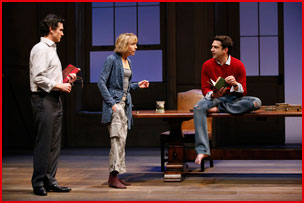In today’s Wall Street Journal I review the Broadway transfer of David Leveaux’s London revival of Tom Stoppard’s Arcadia. I wanted it to be a lot better than it was. Here’s an excerpt.
* * *
Enough about “Spider-Man” already–Tom Stoppard is back on Broadway! Only time will tell whether “Arcadia” is Mr. Stoppard’s masterpiece, but I don’t think it’s premature to call it one of the key English-language plays of the postwar era, and even in a staging that is less than satisfactory, it makes a rich and affecting impression. Now for the bad news: David Leveaux’s revival of “Arcadia,” which was originally mounted in London two years ago with a different cast, isn’t much better than adequate. When you’re talking about a high-profile revival of a great play, good enough won’t cut it.
 More about that shortly, but first a few heartfelt words about “Arcadia” itself. Last seen on Broadway in 1995, it is an entrancingly clever whodunit for eggheads whose underlying purpose is to dramatize the central problem of modernity: How are we to live our lives if it turns out that they have no ultimate meaning? The play, which is set in an English country house, moves back and forth in time between 1809 and today, and the two main modern-day characters, Hannah (Lia Williams) and Bernard (Billy Crudup), are scholars who are trying to figure out what was going on in the house two centuries earlier. The answer is both astonishing and improbable: Thomasina (Bel Powley), a 13-year-old child prodigy, has figured out the Second Law of Thermodynamics all by herself, much to the bewilderment of Septimus (Tom Riley), her rakish tutor, to whom she is no less precociously attracted.
More about that shortly, but first a few heartfelt words about “Arcadia” itself. Last seen on Broadway in 1995, it is an entrancingly clever whodunit for eggheads whose underlying purpose is to dramatize the central problem of modernity: How are we to live our lives if it turns out that they have no ultimate meaning? The play, which is set in an English country house, moves back and forth in time between 1809 and today, and the two main modern-day characters, Hannah (Lia Williams) and Bernard (Billy Crudup), are scholars who are trying to figure out what was going on in the house two centuries earlier. The answer is both astonishing and improbable: Thomasina (Bel Powley), a 13-year-old child prodigy, has figured out the Second Law of Thermodynamics all by herself, much to the bewilderment of Septimus (Tom Riley), her rakish tutor, to whom she is no less precociously attracted.
The reason why this matters is twofold. Not only does it mean that the universe is slowly and inexorably running down, but it casts a dark shadow of doubt on the optimistic certitude with which Septimus and his contemporaries (not to mention most of us today) lead their well-ordered lives….
“Arcadia,” like “The Coast of Utopia,” is–or should be–far easier to experience than it is to explain. Mr. Stoppard has embedded his philosophical interests in an ingeniously structured double-decker plot that is studded with glints of wicked wit (“Nobody would kill a man and then pan his book. I mean, not in that order”). You don’t have to be a physicist, much less a philosopher, to see what Mr. Stoppard is up to, so long as “Arcadia” is staged and the lines spoken with complete clarity and correct emphasis.
This, alas, is where Mr. Leveaux and his cast go wrong. Time and again Mr. Stoppard’s punch lines go astray or get thrown away, and the trouble starts as soon as the curtain goes up…
* * *
Read the whole thing here.
Tom Stoppard talks about playwrighting with Charlie Rose:
Terry Teachout on the arts in New York City
